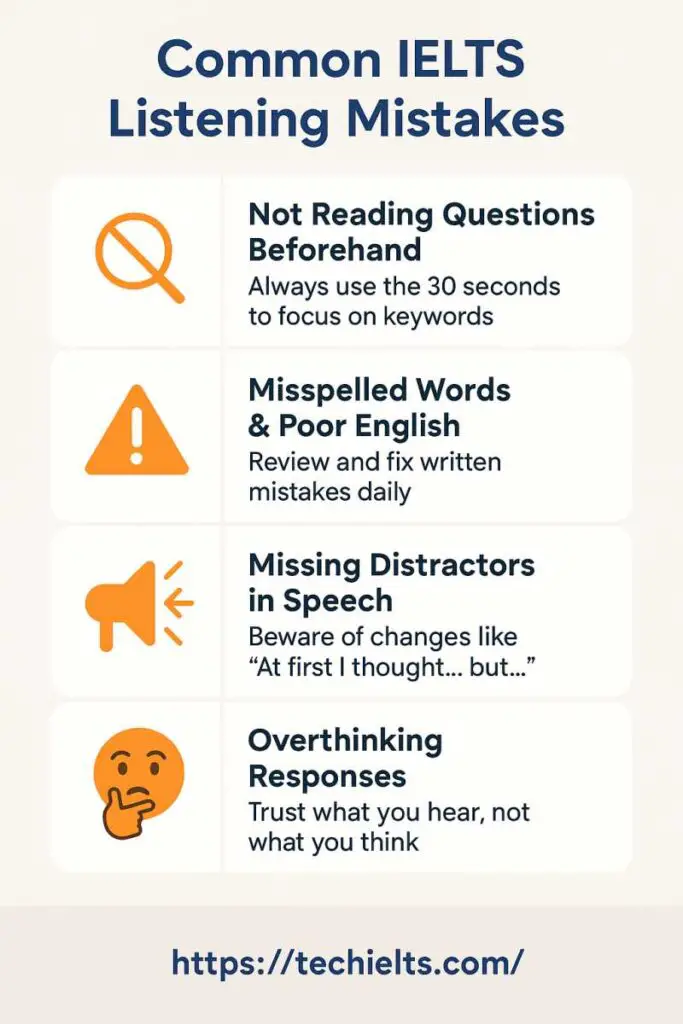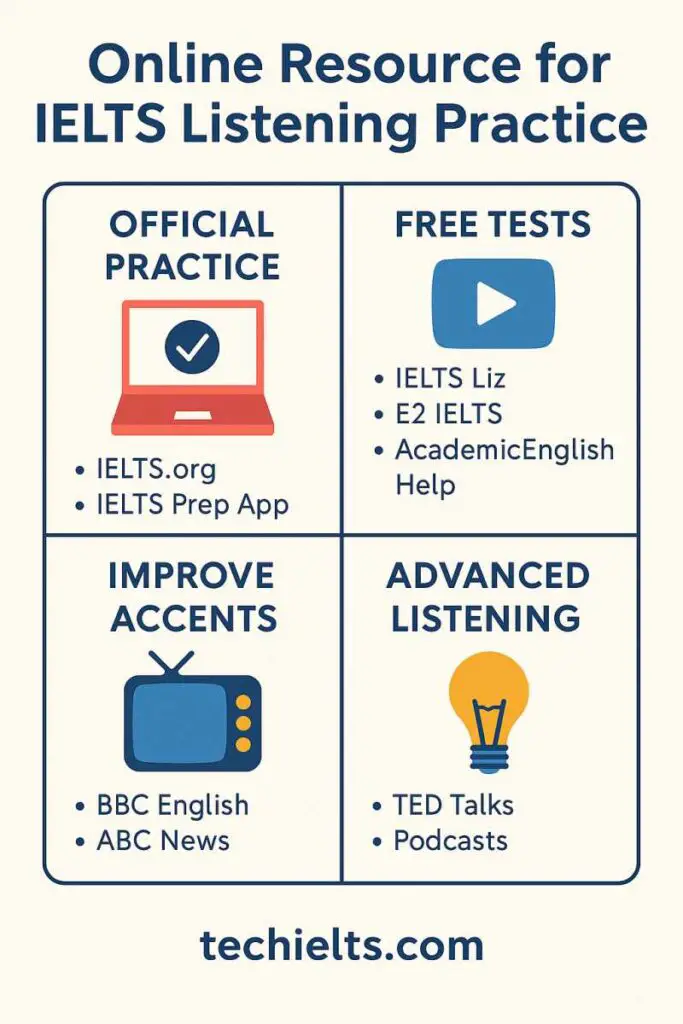Candidates often don’t think much of the IELTS Listening test until they have to understand different English accents, follow spoken directions, and answer 40 questions in 30 minutes.
Don’t worry, though. For a short time, you can quickly improve your listening skills and raise your band score if you use the right methods and online tools.

– Listening Synonyms: Master IELTS Listening Synonyms: Trick for Band 7+
– High-Frequency Words: 378 High-Frequency IELTS Listening Words (Free List)
What you’ll learn in this piece is:
The format of the IELTS listening test
Tips you can use right away to improve your listening skills
Online tools for daily practice, both free and paid
Mistakes people often make and how to avoid them
Now let’s begin.
An Overview of the IELTS Listening Test
A Breakdown of the Format:
Part II Type of Content of Conversation
Part 1: Needs of People Talk (like when you book a room)
Part 2: Needs of people One-person talk (like a tour guide)
Part 3: Setting for education or training Conversation (like kids talking about a project)
Part 4: A subject related to school Lecture-style speech
40 questions in all.
It takes about 30 minutes, plus 10 minutes for the copy (only on paper).
The sound only plays once.
How to Get Better Quickly, Step by Step
1. Learn how the test is set up
You need to know what’s expected of you before you can improve your listening skills.
- Listening for specific information (like names, numbers, and times)
- Knowing what people think and feel
- Following the flow of a talk
- Guessing what words are missing
You can get the original IELTS Listening Answer Sheet here, and filling it out during practice will help you get ready for the real test.
2. Make it a habit to listen every day
Always being the same is the secret tool.
Every day, for 30 minutes, do this:
| Activity | Time |
| Watch or listen | 10 minutes – a short film or podcast (TED-Ed, BBC Learning English) |
| Practice | 10 minutes – use a timer to practise the IELTS listening part |
| Review | 10 minutes – go over the answers, read the text, and make a list of new words |
Make this a daily habit—even 30 minutes a day will help you a lot in two to four weeks.
3. Take real IELTS listening practice tests
It is very important to use real or practical practice tests.
- IELTS.org is the best place to practise for free
- IELTS Prep from the British Council
- IELTS Practice for IDP
- IELTS Liz, AcademicEnglishHelp, and E2 IELTS are all YouTube accounts
Each source has real records of tests that come with answer keys and scripts. Don’t skip the scripts; they’re very important for going over and finding mistakes.
4. Work on your ability to take notes and make predictions
You have to actively guess what will happen in Parts 3 and 4 if you want to do well.
How to Listen Well:
- Highlight important words in the question before the recording begins
- Figure out what kind of word it is (noun, verb, number)
- Use symbols like arrows for cause or growth to make short notes
You might hear someone say something like, “I was going to book a room for three nights… no, actually four.”
This method helps you focus and cut down on mistakes caused by hearing something wrong.
5. Make your spelling and capitalisation better
Even if the answer is right, it will be marked wrong if:
- There are spelling mistakes, like “acommodation” instead of “accommodation”
- There is incorrect capitalisation (like “monday” instead of “Monday”)
Use tools like:
- Spelling quizzes with popular IELTS words
- Google Docs to write and autocorrect text with voice typing
When reviewing, write the answers down more than once to help your brain remember them.
6. Get better at recognising accents
Accents from Britain, Australia, New Zealand, and sometimes North America are used on IELTS.
Watch British Council or Australian news sources to work on your accent.
Check out YouTube accounts such as:
- BBC English Lessons
- TV News Australia ABC
- TED Talks with different speakers
Put on subtitles and then take them off.
7. Make it feel like a real exam
When you’ve had enough practice:
- Take full-length listening tests using a timer
- Find a quiet place to sit down
- Do not pause or play again
- Just like on the real test, fill out the answer sheet
This builds your stamina, timing, and accuracy.
Different kinds of IELTS listening questions
Knowing the different types will help you practise better.

List of Different Types of Questions:
- Note or Form Completion: Fill in the blanks. Guess what kind of word is needed
- Multiple Choice: Pick the right answer. Pay attention to buzzwords and paraphrases
- Matching: Link information to choices. Find similar words
- Diagram or Map Labelling: Label a picture. Follow the direction of space
- Sentence Completion: Finish your sentences. Pay attention to grammar and message
- Short Answer: Answer briefly. Copy the exact words from the audio
What People Usually Do Wrong and How to Avoid It
- Not reading the questions before the recording starts: Always use the 30 seconds to focus on keywords
- Misspelt words and bad English: Review and fix your writing mistakes every day
- Not noticing speech distractions: Watch out for changes like “At first I thought… but…”
- Thinking too much about replies: Trust what you hear, not what you think
- Not checking the answers: Check your spelling and grammar at the end
How to Tell If You’re Making Progress

Weekly, keep track of your findings. Make a chart that looks like this:
| Date of Test | Score (out of 40) | Band | Section You Missed |
| May 5 | 30 | 7.0 | Part 3 (MCQs) |
| May 8 | 32 | 7.5 | Part 4 (Question and Answer) |
This will help you find trends and fix trouble spots more quickly.
Tips from People Who Got a Band 9 on the IELTS
This is what the top scorers do:
- Every day, listen to English, both in official (news) and informal (vlogs, interviews) settings
- Don’t be afraid of fast speakers; instead, listen to material that is naturally fast
- Practise parts over and over until you get 100 percent
- Write down new words, mistakes, and corrections in your own listening log
Tools and Apps for IELTS Listening Practice
| Tool or App | Used For |
| IELTS Prep App (British Council) | Full tests and advice |
| BBC: Learn English | Accents and daily listening |
| TED Talks Mobile App | Advanced language and note-taking |
| YouTube (E2 IELTS, Liz) | Tests and study guides that are free |
| Anki or Quizlet | Reviewing words and spelling |
Correct Answers for the Listening Band Score Table
| Score (out of 40) | Band |
| 39–40 | 9.0 |
| 37–38 | 8.5 |
| 35–36 | 8.0 |
| 32–34 | 7.5 |
| 30–31 | 7.0 |
| 26–29 | 6.5 |
| 23–25 | 6.0 |
To get a good Band 7.5 or higher, you should aim for at least 32 correct answers.
Practice Problems in Real Life
Here’s a short activity:
- Watch or listen to a TED Talk like Brené Brown’s “The Power of Vulnerability”
- Make a list of five terms
- In two lines, sum up the main point
- Find one new word and learn what it means
This helps with vocabulary, listening, understanding, and summarising all at the same time.
Thoughts for Now
You can quickly raise your IELTS Listening score if you use the right approach and practise often. Use real tools, practice tests that are like the real thing, keep track of your progress, and keep pushing yourself.
Don’t change anything, be patient, and accept the process. In three to four weeks, even 30 minutes a day can make a big difference.
Call to Action
What do you find hardest about the IELTS Listening test
Say something below, and let’s talk
If you sign up for our email, you’ll get Band 9 practice tests and tips every week

About the AuthorWelcome to TechIELTS. I’m Md. Jahangir Alam, an experienced engineer with over 15 years in electrical and automation systems. Alongside my engineering career, I’ve developed a strong interest in English language learning and IELTS preparation.
I hold a Duolingo English Test score of 135 (IELTS 7.5 equivalent) and am currently pursuing an M.Sc. in Cyber Security from Royal Holloway, University of London. I use my technical background to create clear, structured IELTS learning materials for students and professionals.
👉 Connect on LinkedIn
